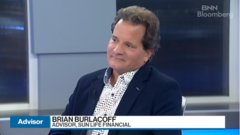May 9, 2019
Richard Croft's Top Picks: May 9, 2019
BNN Bloomberg
Full episode: Market Call Tonight for Thursday, May 9, 2019
Richard Croft, president and chief investment officer at R.N. Croft Financial Group
Focus: Options and ETFs
MARKET OUTLOOK
FOCUS ON TRADE
We’ve been talking about U.S.-China trade negotiations since last November. The ebb and flow of these complex negotiations has sparked rallies and selloffs depending on nuanced press releases by the trade negotiators and the planned on-and-off-again meeting between presidents Donald Trump and Xi Jinping.
Trump had originally set a March 1 deadline, at which point he would increase tariffs if negotiations weren’t going as expected. He eventually extended the deadline indefinitely because he believed the talks were progressing.
In January, I put the odds favoring a new trade agreement at 60-40. I also suggested the deal will not be anything close to what Trump originally envisioned, but that it would be politically palatable to both sides.
The markets are currently pricing the odds at 90-10 in favor of an agreement, which seems reasonable given the slowdown in the Chinese economy. But I’m always concerned when investors buy into the certainty of an outcome within a binary event which will have a meaningful short-term impact on markets.
The biggest risk is that Trump walks away as he did when negotiations with North Korea hit an impasse. And Trump is not the only wildcard: U.S. Trade Representative Robert Lighthizer is notorious for being a rigid negotiator, something Canadians are well aware of. He’s results-oriented with a well-defined agenda and doesn’t politicize sticking points. That’s a volatile one-two punch that can cause shock and awe for markets.
Lighthizer’s key objectives are protection of intellectual property, which U.S. companies must turn over to China as quid pro quo to sell goods and services domestically. Another is subsidies provided by the Chinese government to state-owned enterprises, particularly companies developing artificial intelligence and self-driving cars. Both are barriers that stifle American companies from making foreign investments in China.
There’s been some movement in these twin areas. China recently approved a new law that relaxes restrictions on foreign investment. The mostly-ceremonial new measure supposedly prevents Chinese officials from forcing U.S. and other foreign companies to turn over proprietary technology. It also relaxes a requirement that U.S. companies must partner with a Chinese company in order to gain regulatory approval. If nothing else, China’s willingness to engage in such changes shows that both sides are working from the same playbook.
Despite the longer-term risks, I do believe we will get a politically palatable trade deal. And while that outcome has been mostly priced into the market, I believe it could set the stage for a longer-term rally that could push indexes like the Dow above 40,000 within the next three years.
Think of this as a panic-driven melt-up as individual investors which have missed much of the current move jump back into the market. Such melt-ups rarely end well and the ensuing sell-off may make the financial crisis look like a walk in the park. Hence the logic underpinning the previous discussion about the longer-term impact on the decoupling of both countries’ relationship. But that could be three to five years away. For now, let’s enjoy the ride.
TOP PICKS
BCE (BCE.TO)
BCE has increased its dividend 16 times since 2007. The dividend has more than doubled from $1.46 to its current $3.17 run rate per year. I believe the company will be able to maintain its dividend payout and should continue bumping the dividend through at least 2020.
PREMIUM INCOME PREFERRED SHARES (PICa_pr.TO)
Premium Income Preferred A Split Shares. This is a complex split share investment product that holds units of the Big Six banks. There are capital shares and preferred shares. The premium income preferred unitholders are first in line to receive any premium income from the sale of call options on the underlying shares plus dividends paid by the banks. The preferred shares are redeemable from time to time at $15 per share and there are retraction privileges that can be found in the prospectus.
CIBC (CM.TO)
I’m not promoting CIBC as necessarily the best Canadian bank, but it is the highest-yielding one. It has raised its dividend seven times since 2016.
PAST PICKS: AUG. 2, 2018
APPLE COVERED CALL (AAPL.O)
- Then: $201.50
- Net cost per share: $195.05
- Now: $200.72
- Total return: 4%
NETFLIX COVERED CALL (NLFX.O)
- Then: $338.50
- Net cost per share: $317.00
- Now: $362.75
- Total return: 13%
ISHARES EDGE MSCI MOMENTUM ETF (MTUM.O)
- Then: $ 113.02
- Now: $112.60
- Return: 0%
- Total return: 1%
Total return average: 6%
WEBSITE: @croftgroup
TWITTER: croftgroup.com












